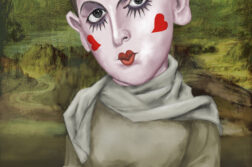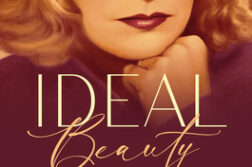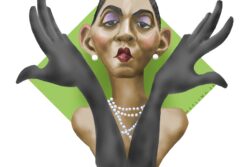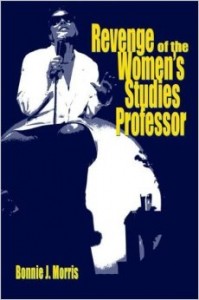 Revenge of the Women’s Studies Professor
Revenge of the Women’s Studies Professor
by Bonnie J. Morris
Indiana University Press, 167 pages, $19.95
Building on a monologue that the author has been performing as a one-woman show for over a decade, Revenge of the Women’s Studies Professor recounts the author’s experiences as a student and later as an instructor of women’s history in various institutions of higher learning across the U.S. The book is full of anecdotes about how the field of women’s studies is dismissed by many academics—notably historians—as not a “real” field of study. A college professor myself, I long ago ceased to be amazed by the lack of enlightenment demonstrated by some of those with the most exposure to education. What I found more informative in this book were the many comments from students’ papers, e-mails, and conversations. The fact that Morris encounters uncivil and wildly uninformed sexism from male undergraduates, while discouraging, does not come as a revelation. What’s disconcerting are the many remarks from young women who don’t think of themselves as “women” at all, but instead as “girls” who have no desire to assume adult responsibility but seem comfortable in the dependent roles of adolescents. They obsess constantly about what their friends and boyfriends think of them, but about their future careers, not so much. To be sure, Morris also provides positive examples, and the general sense of dismay is frequently broken up with humor. As Morris explains at one point, she took it as her mission “to put a friendly face on women’s history.” While the book was apparently written with a female audience in mind, both men and women in and out of academia can gain insight from it into what’s happening on American college campuses today.
Richard M. Berrong
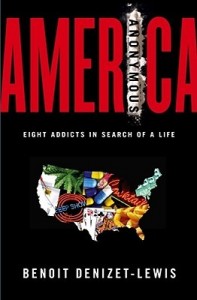 America Anonymous: Eight Addicts in Search of a Life
America Anonymous: Eight Addicts in Search of a Life
by Benoit Denizet-Lewis
Simon & Schuster. 342 pages, $26.
Benoit Denizet-Lewis knows about addiction. The New York Times Magazine contributor is a self-described sex addict who writes about it along with several other varieties of addiction in America Anonymous. “If you ask alcoholics about the first time they became drunk, many will say it was the moment they finally felt O.K. with the world,” he writes. “I never had that sensation while drunk or stoned, but I did feel it the first time I entered a gay men’s chat room.” The openly gay author’s experiences dealing with one-night stands and on-line hookups form the groundwork for this intense book about obsession, vice, and compulsion. The author provides an introduction to his own addiction that’s both honest and powerful. He also explores the lives of eight other addicts from across the country, each with his or her own story to tell: Bobby, 34, an unemployed heroin user; Marvin, 80, a retired alcoholic; Todd, 40, a male escort addicted to crystal meth; Ellen, 51, a food-obsessed radio D.J.; Sean, 20, a college-age sex and pornography addict; Janice, 55, unemployed and on crack; Kate, 32, a stay-at-home mother who shoplifts; and Jody, 32, an addiction counselor with drug, gambling, and smoking habits. Thanks to the author’s keen powers of observation, the book takes a sensitive, serious tour through their tumultuous lives, painting portraits of desperation, depression, and hope. The author focuses on both the addicts’ hardships and their recovery process, however rocky in many cases. The book can be considered as much a work of solid investigative journalism as it is a depiction of the modern health and psychiatric system. (The author is known for his solid investigations into “the down low,” gender dysphoria, lipstick lesbians, and Jake Gyllenhaal.) Each subject’s frankness gives credibility to issues that are easily ignored or stereotyped. But the book delves deeper still, imparting important wisdom about the rocky roads many people take and the damage that can sometimes be undone.
Natalie Hope McDonald





